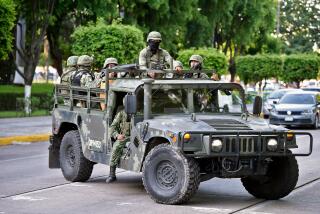U.S. wants Pakistan to pursue Taliban-allied group
As Pakistan forges ahead with its bid to uproot Taliban fighters from tribal areas along the border with Afghanistan, its troops are bypassing an enemy that the Obama administration desperately wants confronted.
Rather than expand on its gains in South Waziristan and drive into North Waziristan to tackle the Haqqani network -- a wing of the Taliban that views U.S. and NATO-led troops in Afghanistan as its principal target -- the Pakistani military is now focusing its attention on driving Taliban militants from their strongholds in the surrounding tribal regions of Kurram, Orakzai and Khyber.
One reason Pakistan has refused to go after the Haqqani network, a senior Pakistani official says, is that it doesn’t have the manpower to fight concentrations of militants on multiple fronts. Pakistani troops are deployed in the Swat Valley, from which they drove out Taliban fighters in a large offensive in the summer. An additional 30,000 troops are winding down major operations in South Waziristan, the Pakistani Taliban’s primary hub.
Many of those fighters fled to nearby tribal regions, such as Kurram and Orakzai, which is why the Pakistani military has stepped up airstrikes in those areas to prevent militants from establishing new bases. Earlier this month, Prime Minister Yusaf Raza Gillani said the army’s next major deployment of ground troops may target Orakzai.
“First we would like to consolidate and stabilize, and not get into something that overstretches us,” said the official, who spoke on condition of anonymity.
The bigger reason for Pakistan’s reluctance to cooperate, however, lies in the government’s ardent belief that the Haqqani network, led by Afghan commander Jalaluddin Haqqani and his son, Sirajuddin, does not pose a direct threat to Pakistan.
Instead, a friendly relationship with the Afghan Taliban is seen by many Pakistanis as a valuable hedge against Pakistan’s archrival, India, meddling in Afghanistan. Pakistanis also view the Haqqanis and the rest of the Afghan Taliban as crucial players in Afghanistan’s future once the U.S. pulls out. At that point, Pakistan would prefer the Taliban as an ally and not a foe.
“The Americans will leave in 18 months, and the Taliban won’t be defeated. If Pakistan has earned the hostility of the Afghan Taliban, it will be in trouble,” said Javed Hussain, a retired brigadier and a former special forces commander. “This concern of Pakistan’s is genuine. We cannot afford to earn the wrath of the Taliban and the Haqqani group.”
In recent weeks, President Obama has sent several top officials to make the case for going after the Haqqani network, including Gen. David H. Petraeus, head of U.S. Central Command, Adm. Michael G. Mullen, chairman of the Joint Chiefs of Staff, and James L. Jones, the national security advisor. Although Pakistan so far has balked at Obama’s demands, U.S. officials have not given up.
“I’m not going to give a grade to a work in progress,” said Richard C. Holbrooke, Obama’s special envoy for Afghanistan and Pakistan, during an appearance on PBS’ “The Charlie Rose Show” on Dec. 21.
Meanwhile, Pakistan’s reluctance may prompt an increase in U.S. Predator drone strikes in North Waziristan and the rest of the tribal areas. On Dec. 17, U.S. drone strikes killed 16 people at suspected militant hide-outs near Miram Shah, North Waziristan’s largest town. The next day, another drone strike killed six suspected militants in the same area.
Drone strikes have become a cornerstone of Obama’s strategy against Al Qaeda and the Taliban in the border region. At least 10 suspected senior Al Qaeda operatives have been killed in such strikes since August 2008. The use of drones has angered Pakistanis, who argue that the strikes kill mostly civilians and trample on their country’s sovereignty.
But the Pakistani government tacitly allows the strikes, which frequently target the Haqqani network.
“These drone attacks are disadvantageous for the U.S.,” said Fakhrul Islam, a tribal areas expert at Peshawar University. “The Pakistani population isn’t happy with these attacks, and they give the Taliban a chance to talk about the killing of innocent people as a result of drone strikes.”
Pakistan’s stance toward the Haqqani network is rooted in its nearly 30-year relationship with Jalaluddin Haqqani, a Pashtun warlord who organized mujahedin fighters against Soviet troops in the 1980s. At the time, he had nurtured ties with Pakistan’s Inter-Services Intelligence agency, as well as with the CIA.
Haqqani has maintained strong ties with Pakistan despite Islamabad’s alliance with Washington. Now believed to be in his late 50s, he has handed over control of his network to his son, Sirajuddin. Hussain said the Haqqanis run a fighting force of about 5,000 that splits its time between Afghanistan and Pakistan.
The Haqqanis’ alliance with Taliban commander Hafiz Gul Bahadur, also based in North Waziristan, further complicates Pakistan’s strategy in the area. Bahadur agreed to not interfere with the army’s operations in South Waziristan against the rival Pakistani Taliban faction led by Hakimullah Mahsud. A military push into North Waziristan now might be viewed by Bahadur as a betrayal of that agreement.
Some of the Al Qaeda militants who fled South Waziristan are believed to be hiding in North Waziristan. The desolate, largely ungoverned territory may also have become a sanctuary for top Al Qaeda leaders. Although U.S. leaders say they have no firm knowledge of Osama bin Laden’s whereabouts, U.S. Defense Secretary Robert M. Gates said this month that the Al Qaeda leader is probably in North Waziristan.
Pakistani officials say that Al Qaeda remains a priority for them but that now is not the right time for troops to move into North Waziristan.
“Uzbek and Arab fighters from South Waziristan are on the run, and there are elements of [Al Qaeda] in North Waziristan,” the senior Pakistani official said. “But when one has the plate full, one does not want to get into a conflict where you dilute your power. Then you achieve nothing.”
More to Read
Sign up for Essential California
The most important California stories and recommendations in your inbox every morning.
You may occasionally receive promotional content from the Los Angeles Times.





